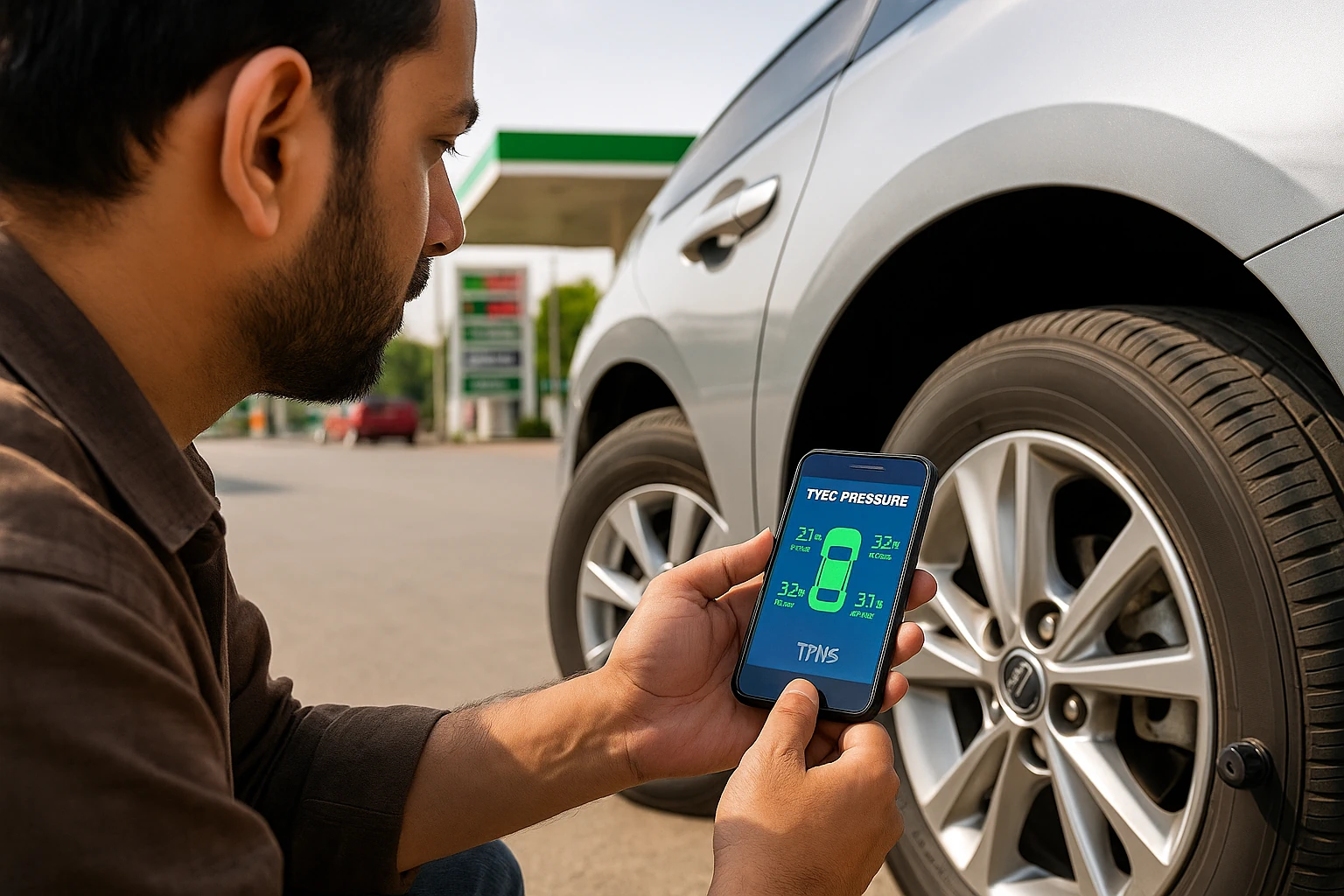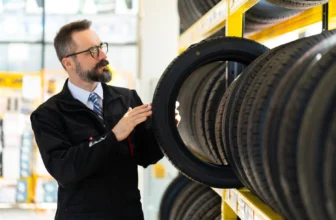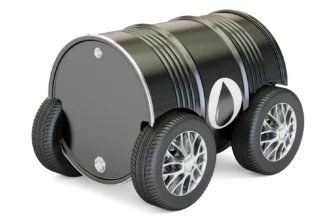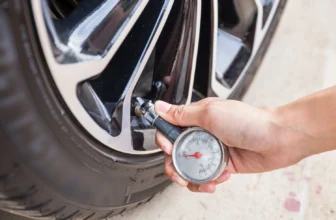
Why Pakistani Drivers Are Switching to Tyre Pressure Monitoring Systems (TPMS) in 2025
Pakistani drivers are facing rising fuel prices, unpredictable road conditions, and the constant challenge of maintaining tyre health in 2025. Amid these challenges, many are now turning to Tyre Pressure Monitoring Systems (TPMS) to save fuel, extend tyre life, and improve road safety. Once seen as a premium feature in imported vehicles, TPMS is quickly becoming a practical necessity for everyday drivers in Pakistan.
What is a Tyre Pressure Monitoring System (TPMS)?
Understanding TPMS
A Tyre Pressure Monitoring System (TPMS) is a technology that continuously monitors the air pressure inside your vehicle’s tyres and alerts you if it drops below or rises above the recommended levels. By using sensors installed in each tyre, TPMS provides real-time updates to the driver, either through a dashboard display or a connected mobile app, helping to ensure tyres remain at optimal pressure levels during daily drives.
Types of TPMS
- Direct TPMS: Uses sensors inside the tyres to measure pressure accurately and sends data directly to the car’s display or an external receiver.
- Indirect TPMS: Utilizes the car’s ABS system to detect differences in wheel rotation speeds, indirectly indicating underinflation.
Direct TPMS is considered more precise, while indirect systems are typically integrated into some vehicle models without additional hardware installation.
Examples in Pakistan
- Imported cars like the Toyota Prius and Honda Vezel often come with factory-installed TPMS.
- Newer local models such as the Suzuki Swift 2024 and some Kia Sportage variants now offer TPMS as a standard or optional feature.
- Aftermarket TPMS kits are available for any vehicle, allowing Pakistani drivers to add this feature without changing their car.
Rising Fuel Costs and TPMS Adoption
Fuel Efficiency and Tyre Pressure
Maintaining the correct tyre pressure is directly linked to fuel efficiency. Underinflated tyres increase rolling resistance, forcing the engine to work harder and burn more fuel to maintain the same speed. With petrol and diesel prices continuing to rise in Pakistan, drivers are actively looking for practical ways to reduce their monthly fuel expenses, and TPMS offers a reliable solution to monitor and maintain optimal tyre pressure without guesswork.
Reported Fuel Savings
- Drivers using TPMS report a fuel efficiency improvement of 3–5% on average, depending on driving habits and tyre conditions.
- For a car averaging 12 km/l, this could translate to an additional 0.5–0.7 km/l, which can save thousands of rupees annually.
- TPMS also helps drivers identify slow leaks early, preventing unnoticed underinflation that can drain fuel economy over time.
Real-World Example
A Lahore-based commuter reported that after installing an aftermarket TPMS kit on his Suzuki Wagon R, he noticed a 4% improvement in fuel efficiency over three months by keeping his tyres consistently at the recommended pressure, offsetting part of the fuel price increase experienced in 2025.
Tyre Longevity and Reduced Maintenance Costs
Impact on Tyre Life
Driving with underinflated or overinflated tyres causes uneven wear, reducing tyre lifespan and increasing the risk of sudden punctures or sidewall damage, especially on Pakistan’s rough roads. By maintaining the correct pressure consistently, TPMS helps ensure even tread wear across all tyres, extending their usable life and delaying the need for replacements.
Cost Savings on Tyre Replacement
- Correct tyre pressure can extend tyre life by up to 20%, which translates into significant cost savings for drivers.
- For commonly used tyres costing between PKR 8,000–15,000 per tyre, longer tyre life can save up to PKR 15,000–30,000 over two years.
- TPMS helps identify slow leaks or pressure drops early, allowing timely repairs before a full replacement becomes necessary.
Reduced Emergency Repairs
TPMS alerts drivers to low-pressure situations before they escalate into roadside emergencies, helping prevent blowouts or flat tyres on highways, where quick assistance can be costly and dangerous.
Road Safety Concerns Driving TPMS Use
Reducing Accident Risks
Incorrect tyre pressure can affect braking distances, steering control, and overall vehicle stability, increasing accident risks. In Pakistan, where long highway drives and variable weather are common, maintaining correct tyre pressure is essential for safe driving. TPMS helps reduce these risks by notifying drivers immediately when tyre pressure deviates from recommended levels.
Handling Extreme Weather Conditions
- High summer temperatures in Pakistan can increase tyre pressure, while winter mornings can reduce it significantly.
- TPMS ensures drivers can monitor and adjust tyre pressure promptly according to seasonal conditions.
- This proactive approach reduces tyre-related incidents, which are a common cause of accidents during seasonal transitions.
Peace of Mind for Highway Travel
Drivers traveling on the M2, M3, and other major highways report improved confidence during long-distance travel with TPMS installed, knowing they will receive instant alerts if any tyre develops an issue mid-journey.
TPMS Availability and Pricing in Pakistan
Availability of TPMS Kits
TPMS kits are now widely available in Pakistan through auto accessory shops, tyre dealers, and online platforms. Both Bluetooth-enabled and in-dash display systems are accessible for various budgets, allowing drivers of all vehicle types to add TPMS functionality easily.
Pricing Range
- Basic valve-cap TPMS kits start around PKR 5,000–8,000.
- Bluetooth TPMS kits with mobile app integration range between PKR 9,000–15,000.
- Premium in-dash TPMS kits with direct sensor integration cost between PKR 15,000–30,000 depending on features.
These prices make TPMS accessible for drivers seeking safety and fuel savings in a cost-effective manner.
Availability in Local Markets
- Lahore: Montgomery Road and major tyre markets stock TPMS options.
- Karachi: Saddar and Tariq Road auto parts markets have a variety of TPMS systems.
- Islamabad: G-8 and I-9 markets offer TPMS kits with installation support.
Additionally, e-commerce platforms like Daraz and PakWheels Auto Store are providing TPMS with delivery options across Pakistan, making it easy for drivers to access and install these systems.
Real Pakistani Driver Experiences with TPMS
Feedback from Daily Commuters
Pakistani drivers using TPMS report higher confidence during daily commutes, knowing their tyres are always at the correct pressure. Commuters in Karachi and Lahore have shared that they no longer need to guess tyre conditions before long drives or rely on manual pressure checks at petrol stations.
Case Studies
- A Suzuki Alto owner in Karachi observed a consistent 4% fuel saving over three months after installing a Bluetooth TPMS kit.
- A Honda Civic owner in Islamabad avoided a potential blowout on the motorway when TPMS alerted him to a sudden tyre pressure drop caused by a nail puncture.
- Rideshare drivers using Careem and InDrive have reported reduced downtime and tyre replacement frequency after consistent use of TPMS.
Ease of Use and Maintenance
Most users find TPMS systems straightforward to use, with clear alerts and simple maintenance such as occasional sensor battery replacements. Feedback from drivers indicates that TPMS becomes an essential part of their car care routine within weeks of installation.
Practical Tips for Choosing and Maintaining TPMS
Choosing the Right TPMS
- Bluetooth TPMS: Suitable for drivers who prefer monitoring tyre pressure through a smartphone app.
- In-dash TPMS: Ideal for drivers seeking a factory-like integration with real-time monitoring while driving.
- Valve-cap TPMS: Budget-friendly, easy to install, and effective for basic pressure monitoring.
Maintenance Best Practices
- Regularly check sensor battery status and replace when low.
- Calibrate sensors if needed after tyre rotation or replacement.
- Respond promptly to alerts by checking tyre pressure and addressing leaks or punctures without delay.
Where to Buy Reliable TPMS in Pakistan
- Authorized auto accessory shops in major cities.
- Daraz and PakWheels Auto Store for online purchase with nationwide delivery.
- Specialist tyre shops offering TPMS installation alongside tyre balancing and alignment services.
Conclusion
With fuel prices rising and road safety becoming a priority in Pakistan, Tyre Pressure Monitoring Systems (TPMS) are shifting from being a luxury feature to a smart, practical investment for everyday drivers. TPMS helps maintain optimal tyre pressure, improving fuel efficiency, extending tyre life, and reducing the risk of accidents caused by underinflated or overinflated tyres.
Pakistani drivers adopting TPMS are experiencing direct benefits in their wallets and their driving confidence, making it a valuable addition for anyone seeking to manage vehicle costs and safety effectively in 2025. As TPMS becomes more accessible and affordable across the country, it is a tool worth considering for smarter, safer, and cost-effective driving.






